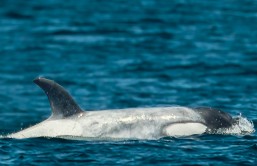A dangerous jellyfish called the Portuguese man-o-war was found on the shore of Harvey Cedars Beach, N.J.
Lifeguards discovered the purplish-blue jellyfish on Sunday and warned beachgoers to stay away in case they see one.
"This morning we found a Portuguese man-o-war washed up on the beach," the Harvey Cedars Beach Patrol posted in its Facebook page. The post also explained the possible reason for why the jellyfish, which was not a common sighting in the area, turned up at the Long Beach Island shore.
"When the wind is coming from the northeast, warm water from the Gulf Stream comes to shore. With the warm water, often comes seaweed and critters from down south. Always be aware of your surroundings in the ocean and always swim near a lifeguard," the Facebook post said.
The Portuguese man-o-war, which is also known as "floating terror," has venomous tentacles that can grow up to 30 feet. Unlike other jellyfish commonly found along the shores of New Jersey, its very painful sting can be deadly.
"Their stings are among the most painful and if somebody is allergic to bee stings or something like that, you can go into shock," said Paul Bologna, associate professor of biology and director of the Marine Biology and Coastal Sciences Program at Montclair State University, according to NBC New York.
A person suffering from the jellyfish's stings may experience chest pain, abdominal pain, headache, muscle pains, weakness and difficulty in swallowing. "They're very, very dangerous, very painful sting," Bologna said. "In some cases, they can be life-threatening," he added, Asbury Park Press reported.
According to experts, the appearance of the Portuguese man-o-war in New Jersey does not necessarily mean that there is an invasion of the species. They classify the occurrence as an isolated case of a warm water organism riding on the Gulf Stream and being brought by the wind to the Harvey Cedars shore.
"Nobody is saying this is a new trend that we're going to be seeing more of. They show up periodically, get caught in the Gulf Stream, spin off and wind up here," said American Littoral Society executive director Tim Dillingham, according to ABC News.








